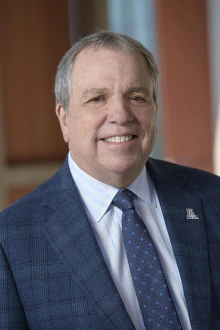Dr. Michael D. Dake Receives Teacher, Leader, Scholar Award
Michael D. Dake, MD, senior vice president for the University of Arizona Health Sciences, received the ATLAS Award and presented the ATLAS Lecture during the Vascular InterVentional Advances Foundation’s educational symposium in Las Vegas on Oct. 31.

Michael D. Dake, MD
“It was a true privilege to be able to deliver the ATLAS Lecture and explore the current challenges facing the health care workforce in our country and how the next generation will be educated,” Dr. Dake said. “Staffing shortages are currently affecting every field involved in providing health care in the U.S. This is particularly concerning in underserved areas and populations.”
Dr. Dake joined UArizona Health Sciences as senior vice president in 2018. Prior to that he was the Thelma and Henry Doelger Professor of Cardiothoracic Surgery at Stanford University. While at Stanford, he served as division chief of interventional radiology for 15 years and was director of the Catheterization and Angiography Laboratories at Stanford Medical Center. Previously, he served as chairman of the Department of Radiology at the University of Virginia.
In 1992, Dr. Dake made medical history with the implantation of the world’s first thoracic stent-graft at Stanford. He has also conducted groundbreaking research with CT angiography and stent-grafts. He is internationally known for pioneering image-guided therapies and novel approaches in interventional therapy in the fields of vascular imaging, venous thromboembolic disease, aortic aneurysms and dissection.
“How we will educate the next generation of health care workers and specifically physicians is at the heart of the ATLAS lecture I delivered,” Dr. Dake said. “Although this generational question goes beyond today’s shortages and market trends, these forces must factor into how future physicians are recruited and curricula are designed, along with other global trends such as the convergence of precision health, digital health and big data. It is incumbent for all of us in the business of education to commit to reimagining every aspect of training for our students, with the ultimate goal of being able to effectively train students to be maximally effective 21st century practitioners.”
Dr. Dake is a graduate of Harvard College and Baylor College of Medicine, where he completed an internship, residency and chief residency in internal medicine. He pursued fellowship training in pulmonary diseases followed by a residency and chief residency in radiology at the University of California San Francisco. He went on to complete subspecialty training in vascular and interventional radiology at UCSF.
The VIVA Foundation is a “not-for-profit organization dedicated to advancing the field of vascular medicine and intervention through education, research, advocacy and collaboration.”

